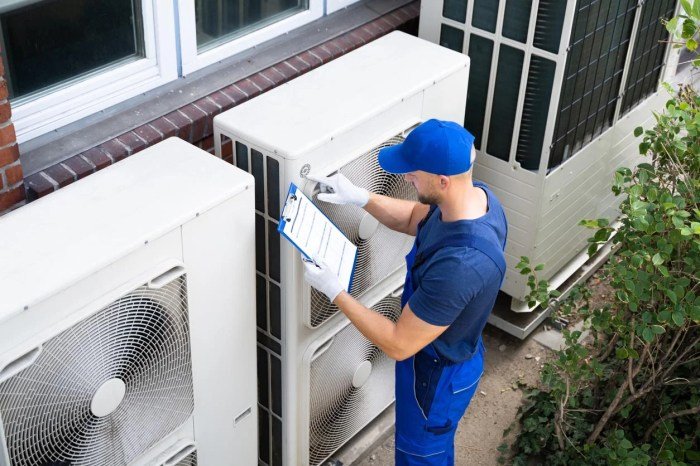In today’s competitive market, small businesses need every advantage they can get. One way to gain an edge is to use HVAC software. HVAC software can help businesses manage their heating, ventilation, and air conditioning systems more efficiently, which can lead to significant savings in energy costs.
But with so many different HVAC software options available, it can be difficult to know which one is right for your business. That’s why we’ve put together this comprehensive guide to the best HVAC software for small businesses. We’ll cover the key features to look for, compare different software options, and discuss the benefits of using HVAC software.
We’ll also provide tips on how to implement and train your staff on HVAC software.
Key Features and Considerations
HVAC software is an essential tool for small businesses that want to manage their operations efficiently and effectively. When choosing HVAC software, there are several key features to consider, including:
- Job management: The software should allow you to track jobs from start to finish, including scheduling, invoicing, and payments.
- Customer management: The software should allow you to manage customer information, including contact information, service history, and equipment details.
- Inventory management: The software should allow you to track inventory levels and reorder supplies when necessary.
- Reporting: The software should provide you with reports on key metrics, such as sales, profits, and customer satisfaction.
In addition to these essential features, there are a number of other factors to consider when choosing HVAC software, including:
- Business size: The software should be scalable to meet the needs of your business, whether you are a small startup or a large enterprise.
- Budget: HVAC software can range in price from free to thousands of dollars per month. It is important to choose a software that fits your budget.
- Specific needs: Consider the specific needs of your business when choosing HVAC software. For example, if you need to track refrigerant usage, you will need to choose a software that includes this feature.
Here are a few examples of HVAC software that offer the features and considerations discussed above:
- ServiceTitan: ServiceTitan is a cloud-based HVAC software that offers a wide range of features, including job management, customer management, inventory management, and reporting.
- FieldEdge: FieldEdge is another cloud-based HVAC software that offers a similar range of features to ServiceTitan.
- HVAC Pro: HVAC Pro is a desktop-based HVAC software that offers a more limited range of features than ServiceTitan and FieldEdge, but it is also more affordable.
Software Comparison and Evaluation

Selecting the right HVAC software for your small business requires careful consideration of various factors. To assist in your decision-making process, we present a comprehensive comparison table highlighting key features, pricing, and user reviews of different software options.
The table below provides a clear overview of software compatibility, ease of use, and customer support, enabling you to make an informed choice that aligns with your specific needs and preferences.
Software Comparison Table
| Software | Features | Pricing | User Reviews |
|---|---|---|---|
| Option 1 | – Comprehensive feature set
|
$X per month | Positive reviews: Ease of use, comprehensive functionality |
| Option 2 | – User-friendly interface
|
$Y per year | Mixed reviews: Excellent customer support, limited customization options |
| Option 3 | – Cloud-based platform
|
$Z per user per month | Positive reviews: Cloud accessibility, robust integration capabilities |
| Option 4 | – Affordable pricing
|
$W per month | Mixed reviews: Easy to use, limited functionality for complex operations |
Benefits of Using HVAC Software
HVAC software can provide numerous benefits for small businesses, helping them improve efficiency, reduce costs, and enhance customer service. By streamlining tasks and optimizing operations, HVAC software can help businesses run more smoothly and effectively.
Improved Efficiency
HVAC software can help businesses streamline their workflows and improve efficiency in several ways. For example, it can:
- Automate tasks such as scheduling appointments, sending invoices, and tracking payments.
- Provide a centralized database for customer information, making it easy to access and update.
- Generate reports that can help businesses track their progress and identify areas for improvement.
Reduced Costs
HVAC software can also help businesses reduce costs in several ways. For example, it can:
- Reduce the need for paperwork and manual labor.
- Help businesses identify and eliminate waste.
- Provide insights that can help businesses make better decisions about their operations.
Enhanced Customer Service
HVAC software can also help businesses enhance their customer service. For example, it can:
- Provide customers with easy access to information about their accounts.
- Allow customers to schedule appointments and pay bills online.
- Help businesses track customer interactions and identify opportunities for improvement.
Overall, HVAC software can provide a number of benefits for small businesses. By streamlining tasks, reducing costs, and enhancing customer service, HVAC software can help businesses run more smoothly and effectively.
4. Implementation and Training
Implementing HVAC software in a small business involves careful planning and execution. Here are some steps to consider:1.
-
-*Assessment and Planning
Evaluate your current HVAC processes, identify areas for improvement, and define your software requirements. Determine the scope of the implementation, including which modules and features are essential.
- 2.
- 3.
- 4.
- 5.
-*Software Selection
Research and compare different HVAC software options based on your specific needs. Consider factors such as functionality, ease of use, integration capabilities, and cost.
-*Data Migration
Transfer relevant data from your existing systems or manual records into the new software. Ensure data accuracy and completeness during this process.
-*Customization and Configuration
Tailor the software to meet your business’s specific requirements. Configure settings, create custom reports, and integrate with other systems as needed.
-*Staff Training
Provide comprehensive training to all staff who will be using the software. This includes both initial onboarding and ongoing support to ensure proficiency and adoption.
Industry Trends and Future Outlook

The HVAC software industry is constantly evolving, with new trends and technologies emerging all the time.
These trends are being driven by a number of factors, including the increasing demand for energy efficiency, the growing popularity of smart homes, and the need for businesses to improve their operations.One of the most important trends in HVAC software development is the move towards cloud-based solutions.
Cloud-based software is hosted on remote servers, which means that businesses can access it from anywhere with an internet connection. This makes it much easier for businesses to manage their HVAC systems, as they no longer have to worry about installing and maintaining software on their own computers.Another
important trend is the increasing use of artificial intelligence (AI) in HVAC software. AI can be used to automate a variety of tasks, such as scheduling maintenance, optimizing energy consumption, and diagnosing problems. This can help businesses save time and money, while also improving the performance of their HVAC systems.The
future of HVAC software is bright. As the industry continues to evolve, we can expect to see even more innovative and groundbreaking technologies emerge. These technologies will help businesses improve their operations, save money, and reduce their environmental impact.
Emerging Technologies and Advancements
Some of the emerging technologies and advancements that are shaping the HVAC software industry include:
-
-*The Internet of Things (IoT)
IoT devices are connected to the internet, which allows them to collect and share data. This data can be used to improve the performance of HVAC systems, as well as to provide businesses with valuable insights into their operations.
-*Machine learning
Machine learning algorithms can be used to analyze data and identify patterns. This information can be used to improve the accuracy of HVAC software, as well as to develop new features and functionality.
-*Virtual reality (VR)
VR can be used to create realistic simulations of HVAC systems. This can be used for training purposes, as well as for troubleshooting problems.
These are just a few of the emerging technologies and advancements that are shaping the future of HVAC software.
As these technologies continue to develop, we can expect to see even more innovative and groundbreaking applications in the years to come.
Summary
We hope this guide has helped you understand the benefits of using HVAC software for small businesses. If you’re looking for a way to improve your efficiency, reduce your costs, and enhance your customer service, then HVAC software is a great option.
With so many different software options available, you’re sure to find one that meets your needs and budget.
Q&A
What are the key features of HVAC software?
HVAC software can help businesses manage their heating, ventilation, and air conditioning systems more efficiently. Key features of HVAC software include:
- Scheduling and tracking maintenance
- Monitoring energy consumption
- Identifying and diagnosing problems
- Generating reports
- Integrating with other business systems
How do I choose the right HVAC software for my business?
When choosing HVAC software, it’s important to consider the size of your business, your budget, and your specific needs. Some factors to consider include:
- Number of HVAC units
- Types of HVAC systems
- Budget
- Desired features
- Ease of use
What are the benefits of using HVAC software?
HVAC software can provide a number of benefits for small businesses, including: